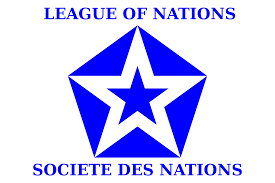|
The League of Nations
The League of Nations was an international organization designed to keep the peace in the wake of the chaos-causing Great War, known to posterity as World War I.  A strong champion of the League was American President Woodrow Wilson, whose Fourteen Points speech included a proposal for such a peace-keeping body. Joining the League required signing and approving a treaty, however, and the U.S. Senate refused to ratify the League treaty and, thus, the United States never joined the League. The League was created, coming into being on Jan. 10, 1920, and did function for a number of years. Headquarters, known as the Palace of Nations, were in Geneva, primarily because of its central location and because Switzerland had been neutral during World War I. The original members were these:
Other countries to join were these:
1921
1922 1923
1924 1926 1931 1932
1934
1937 Subsequent members could be admitted after assent of a two-thirds majority of the governing body, the Assembly. Any member nation could withdraw but not until two years after giving notice to do so. A Covenant governed the responsibilities of the member nations in terms of their own actions and in terms of collective action in response to the actions of a belligerent member nation. For example, if two countries had a dispute, the League would encourage representatives of both countries to discuss their differences in person and to find a peaceful outcome. This discussion would be facilitated by the League's Assembly. The Assembly would issue warnings to aggressor nations. Failed resolutions of differences could result in the Assembly's declaring economic sanctions against a particular country or, more severely, physical sanctions, the introduction of military force to back up the League's denouncing of an aggressor nation. The League had a governing Council, which consisted of France, Great Britain, Italy, Japan, and the United states as permanent members and four other member nations as chosen by the Assembly. The League nearly every month for its first year of existence, then sporadically after that. In 1923, the Assembly decided that it would meet once every March, June, September, and December (and in special session, if necessary). The League was strong on ideals but weak on practical applications. First and foremost, all decisions of the Assembly had to be unanimous; so, any one member nation could veto any decision and prevent it from happening. Also, the League itself did not have a military force. Any military action required to enforce Assembly decisions or sanctions would have to be provided by a member nation. In the wake of the devastation after World War I ended, no country in Europe was in a position to provide any kind of dedicated military assistance to the League. The League did succeed in resolving several high-profile disputes between member nations, including territorial disputes between Finland and Sweden, Bulgaria and Greece, and Germany and Poland. However, the League is far more well-known for its failure in resolving several other high-profile disputes between member nations. The most well-known are failure of any kind of League pressure to stop Germany (which was, in any case, forbidden membership in the League by the Treaty of Versailles) and Italy rebuilding their militaries and occupying territory in other countries (France and Albania, respectively) in violation of the Treaty of Versailles. As well, the League did not resolve violent disputes between Czechoslovakia and Poland, Lithuania and Russia, and Poland and Russia. Also notable were the League's failures to stop the Spanish Civil War and the Second Sino-Japanese War. What is perhaps not so well-known is that the League of Nations did succeed in resolving several humanitarian crises, including campaign to end slave labor and to eradicate leprosy. The League officially existed until 1947, although its political decision-making was largely rendered moot by the military aggression of various countries in the 1930s and with the beginning of World War II in 1939. The League was succeeded on the international stage by the United Nations. |
Social Studies for Kids |
Social Studies for Kids
copyright 2002–2024
David White





